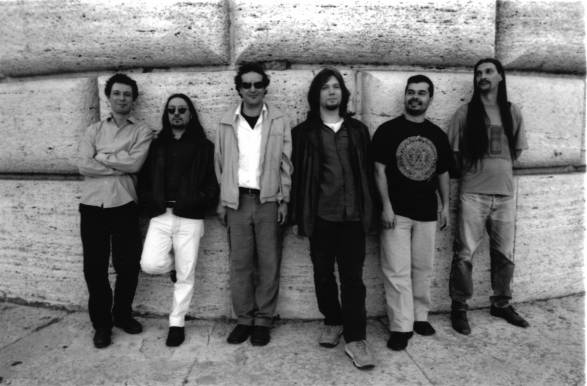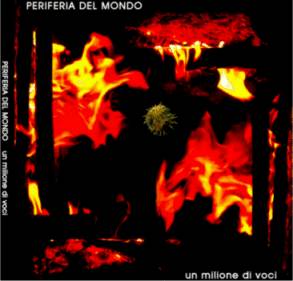Interview

(Progressive Newsletter Nr.45 08/03)
excerpts from an interview with Claudio Braico (Bass), Alessandro Papotto (Vocals, Clarinette, Saxophon, Flute, Percussion), Max G.B. Tommasi (Guitar), Bruno Vegliante (Keyboards), Tony Zito (Drums) and Federica Luzzi (Artwork)
It all began in 1996. Alessandro Papotto is a classical musician with a few experience of progressive rock with former group Nodo Gordiano with which he sang and played woodwinds and keyboards. Bass player Claudio Braico is a ‘noble soul’ lost in music of Cream and Le Orme while guitar player Max G.B. Tommasi loves classic rock, progressive and jazz, but also likes to listen to new stuff like Dream Theatre. We have been playing rock progressive songs of Genesis, Yes, PFM - and we also tried some Gentle Giant too, obtaining terrible results - but in the meanwhile we started writing about ten rock songs, like “In ogni luogo, in ogni tempo” and “Leave your daily”, which were recorded in a demo with a friend of Alessandro, Tony Zito of Nodo Gordiano, playing drums. This demo-recording was presented with the new name of the band, “Periferia Del Mondo” - Suburbs Of the World. It was very difficult for Alessandro to play all those instruments and sing too, so we looked for a good keyboards player and we found Bruno Vegliante. Bruno came along with new sounds - maybe it would be more correct to say ancient sounds, given his vintage hyper-setup. This provoked a change in our composing style; new songs were written and recorded: “L’Infedele” and “Meltèmi”, all of them are influenced by the new line-up in their structure and sounds, moving to a much progressive style. In the spring 2000 our first album was issued: “In ogni luogo, in ogni tempo”. In this time the band acquires a new musician, the violin player Alberto D’Annibale, another friend of Alessandro coming from symphonic orchestra experience. Thanks to his sensitivity and classical technique, he completed the band in the best way. In the concerts with this new line up there was room also for some new piece like “Un borghese piccolo piccolo” and “EvaLunA”. So, after one year of full immersion in our studio and six months of recording, in autumn 2002 was issued our second production “Un milione di voci”.
The music of PDM contains several different styles ranging from progressive rock, jazz rock to classical music. Does this reflect the different background of the musicians involved in PDM and how do you keep the right balance?
Bruno Vegliante: The "minimum common denominator" of this work can be found on its absence; absence as an answer to the boredom of an expectable musical scene, which hooks the listener to the rarely disregarded comfort of his armchair.
Claudio Braico: Each one of us would prefer different music styles but, when we work together, we know how to make a song sound exactly in the way we want.
Max G.B. Tommasi: I don’t think we ever tried to achieve any kind of balance at all. What you hear just happens, and we are glad that you noticed a balance between the styles.

One song on "Un milione di voci" was even sung in English. What was the reason for this choice, for that the rest of the songs are sung in Italian?
Alessandro Papotto: Our albums are not only intended for a local audience, so we decided, from the beginning, to write lyrics in english too; moreover, we like very much the effect of lyrics actually written in a non-perfect language, as we know our English is in songs like “Can stop” or “Leave your daily”, because we believe that it magnifies the imagination of positive listeners, and push them to found on it meanings of their own interest.
Bruno Vegliante: When I wrote this song, I was looking for short phrases that could couple with the metric of song's rhythmic structure, and I immediately found "you can stop". Maybe this phrase is coming out of my mind because in these days a lot of things are happening in the world which I really don’t like, and I would all of these could stop. I also feel the need and it is growing day by day, to make my life easier, but this is more difficult to realize as days go by. Eventually, with this song I wanted to share this feeling with an audience the wider possible. It's very bizarre to see how, sometimes, things run after each other as in a circle, and, for instance, the music in this song is the overlap of a much natural Bossa Nova as J. Gilberto sing on “Desafinado”, with the disturbed 7/8 odd rhythm.
On "Un milione di voci" you had a lot of guest musicians involved. Did you tell them what to play or were they totally free in the way they did contribute?
Alessandro Papotto: Each guest has his own peculiarity, for example Mauro Pagani and Vittorio Nocenzi were totally free to create their solo parts on the finished songs; Alessandro Corsi has played an ostinato line of bass guitar composed by me while Luca Sapio sang a line composed by Max Tommasi and he also sang an improvised line along with me at the saxophone; the string quartets was totally composed and directed by me while Massimo Alviti and Antonio Zappulla had already played my song “Cercando la via” in other occasions; for my piece “Espresso (Part 2)” Giovanna Magliocca played a written part on clavi-synth while Roberto Proietto had already played his guitar line when I composed it during Nodo Gordiano period; my friend Alessandro Parietti was totally free to create his drum section on Tony Zito’s part on “Un milione di voci”, while my cousin Maurizio Papotto sang a line composed by me, it is the reply of Etna God, on “Io brucio”.
You also have a special relationship with Banco, even played together with them on various occasions. How did this friendship evolve?
Alessandro Papotto: From 1999 I’m an effective member of Banco and I’m very happy of this not only because I’m playing with one of my favourite group since I was a child, but also because with them I’ve a lot of professional and human satisfaction. So it is not an occasional collaboration but a true friendship that I hope will continue for a long time.

Can you tell a little bit about the artwork of the album, which was especially created for this album by Federica Luzzi?
Bruno Vegliante: Federica Luzzi teaches Tapestry in San Giacomo School of Art in Rome. She presented her photos and sculptures in many international group and solo exhibitions: Smirne, Ankara, Damascus, Amman, Beiruth, Budapest. She collaborate to butoh japanese dancers realizing interactive textile sculptures and in 2003 she has been invited to exhibit in Graz. But to tell something about the artwork of our album “Un milione di voci” we turn the questions to her…
Federica Luzzi: This artwork "Palingenesi" was born like the other, for project and casuality. I searched for Bruno Vegliante photos and mine to combine. I selected photos of fires shooted by Bruno in a night, in the chimney of him mountain house and my photo of chestnut seed. The final result of the work was a revelation that I usually call "The eye that see clearly", a case of sightedness. From my disposition of the elements, from the details we could see faces, symbols, a world apparently suburban, a reflect of the actual story of humanity.
Besides PDM and Banco you also contributed on different albums with different bands, like Nodo Gordiano, played together with John Wetton and took part on the albums "Omaggio a Demetrio Stratos" and "Fuori Centro". Can you tell a little bit about more this projects and bands?
Alessandro Papotto: I have founded and carried on Nodo Gordiano project since 1994 together with my friend Tony Zito. We have a lot of good memories of those times: our first rock album, our concerts with many guests like Rodolfo Maltese, Francesco Di Giacomo and John Wetton of King Crimson; unfortunately we had to let this project down in 2000 - our first album with PDM had been already issued - because of problems with another member of the project. I will remember that project as my first attempt to write and play rock compositions, in fact I’ve written all the songs of Nodo Gordiano like “Pvtrvs”, “Gordio” and “Il conformista” in 1997 along with some song for PDM like “Leave your daily”, but also as the opportunity to make a lot of experience for our rock musical formation. The compilation “Fuori Centro” is a project in which I played with my jazz group Casamilà with Massimo Alviti but that line up has changed several times. Now I’m still playing with Massimo Alviti and we do hope to release our first album in the next year. During summer 1999 Periferia Del Mondo played at the IV award “Demetrio Stratos Tribute”, in Reggio Emilia. We won the second prize playing “L’infedele”, “Meltèmi”, “Brand-Y” and “Arbeit Macht Frei” as an omage to Area. That evening was recorded and the resulting cd was called “Omaggio a Demetrio Stratos”.
Kristian Selm © Progressive Newsletter 2003